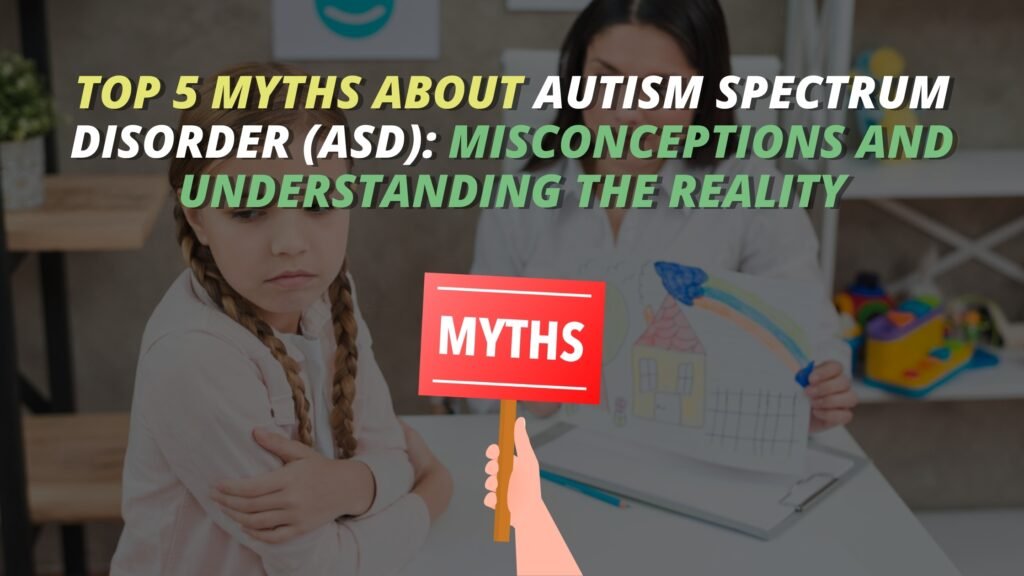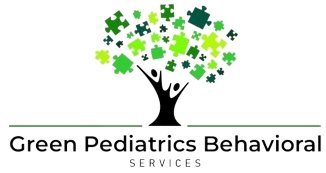Autism, also known as Autism spectrum disorder (ASD), is a condition that impacts individuals’ social interactions, communication abilities, and behaviors due to differences in brain development. Although awareness and understanding of ASD have improved over time, there are still widespread misunderstandings and false beliefs about it. These misconceptions often result in stigma and difficulties for individuals with autism and their families to be accepted.

This blog aims to debunk the top five myths about autism spectrum disorder to encourage better understanding and acceptance.
Myth 1: Autism Is a Rare Problem
Many people believe that Autism Spectrum Disorder is not very common. But actually, it is much more common than people think. The Centers for Disease Control and Prevention (CDC) says about 1 in 54 children in the United States have autism spectrum disorder, making it one of the most common issues in development. Also, autism affects people of all races, cultures, and incomes, showing that it’s not just a problem for a small group of people.
Understanding how many people have autism is important for making people aware and ensuring they get the help they need. When we realize that autism is not rare but something that many people experience, we can include and accept it better in our communities.
Myth 2: All People With Autism Are Really Good At Something
Another thing some people wrongly believe because of what they see on TV or in movies is that everyone with autism is really, really good at something special. They may be amazing at math, music, or art. But not everyone with autism is like that. Autism is a big spectrum, which means each person is different. Some might be good at some things, while others might struggle more.
It’s important to see and appreciate all the different talents and skills that people with autism have, instead of just thinking they’re all the same. When we value each person’s unique strengths, we make a world where everyone feels accepted and supported, including those with autism.
Myth 3: Autism Is Caused By Bad Parenting or Vaccinations
One of the most harmful ideas about autism is the belief that it happens because parents aren’t good enough or because of vaccines given during childhood. Many scientific studies have shown this idea is wrong. They’ve found that autism is a complicated condition caused by many different things, including genetics, environment, and how the brain works. Even though we don’t know everything about what causes autism, scientists think it’s a mix of these factors. Saying that parents or vaccines cause autism makes people feel bad and stops us from helping those with autism and their families. It’s important to use science to understand autism and not spread wrong ideas that make it harder for people with autism to be accepted and included.
Myth 4: People with Autism Lack Empathy Or Emotional Connection
Some think that people with autism don’t feel empathy or connect emotionally with others. But this isn’t true. Many autistic people are actually very empathetic and can build strong relationships. However, they might show their empathy and emotions in a different way than most people, which can lead to misunderstandings.
Even if some individuals with ASD find it hard to pick up on social cues or gestures, it doesn’t mean they don’t understand or feel emotions. By encouraging empathy and understanding towards people with autism, we can make communities that support everyone, no matter how their brain works.
Myth 5: Autism can be “CURED” or Outgrown
Some people mistakenly believe that autism can be fixed or that it goes away as children get older. They think this because they want to help. But the truth is, autism is something that stays with a person for their whole life. However, if we help early on with things like therapy and support, people with autism can learn useful skills and ways to handle the challenges they face.
It’s important to know that autism is a part of who someone is, and it can’t just disappear. Instead of trying to find a way to make it go away, we should focus on making sure people with autism feel accepted, understood, and supported. This way, they can live happy and meaningful lives in their own way.
Conclusion
In conclusion, Autism is a complicated condition that impacts people in various ways. By clearing up misunderstandings about autism, we can help people understand and accept those on the spectrum and their families more. By welcoming the differences in how people’s brains work and appreciating the special skills of those with autism, we can make our society kinder and more supportive for everyone.
